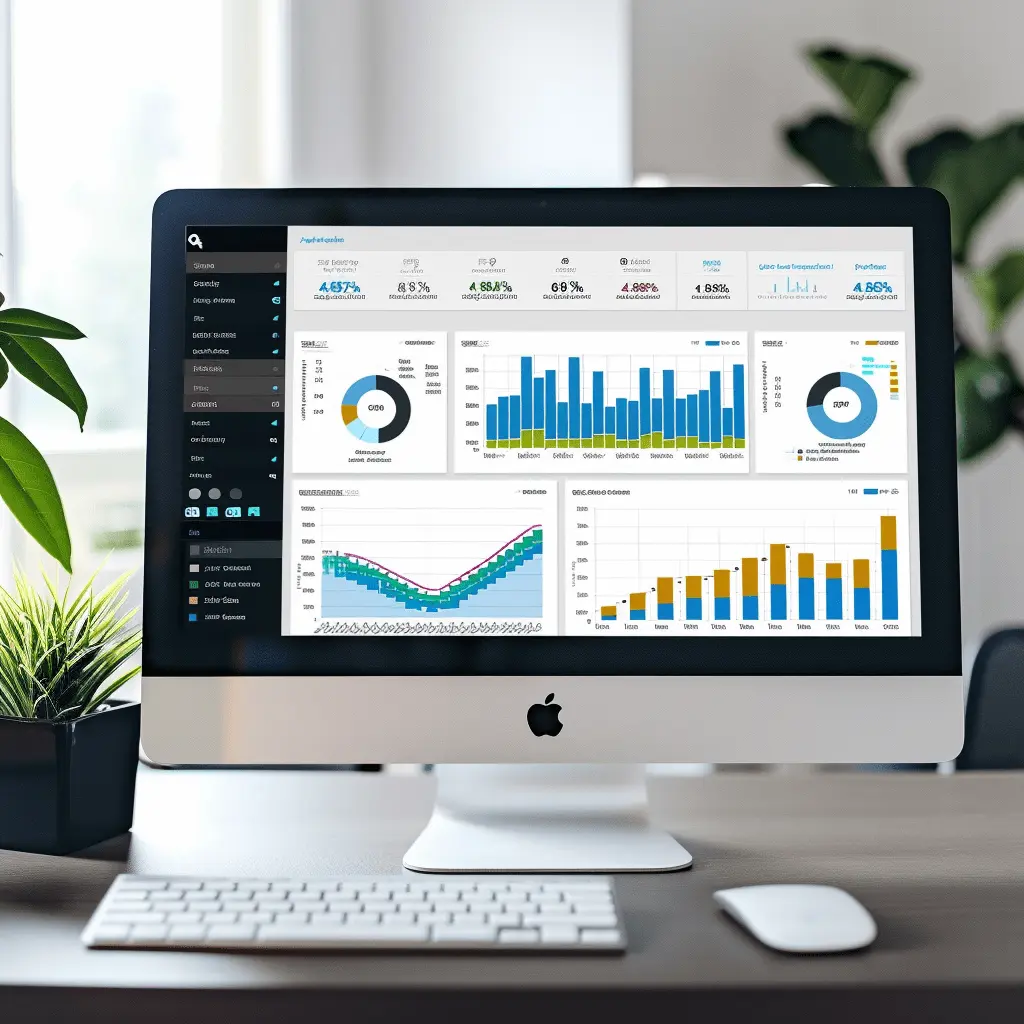Understanding Local SEO
Local SEO is an essential aspect of digital marketing that focuses on optimizing a business’s online presence to attract more local customers. Unlike broader SEO strategies that target global audiences, local SEO hones in on specific communities, towns, or regions, making it particularly beneficial for small and medium-sized businesses.
This form of SEO ensures that your services or products appear prominently when potential customers search for related items in your vicinity. Approximately 46% of all Google searches showcase local intent, signifying a vast pool of opportunities for businesses that can effectively tap into this market.
Key components of local SEO include:
- Geo-specific content and keywords: Tailoring your content to include local names, services, and products.
- Optimized local listings and directories: Ensuring your business is visible and accurately represented in local directories.
- Mobile optimization: With a significant amount of local searches occurring on mobile devices, your online presence needs to be mobile-friendly.
- Reputation management: Engaging with customer reviews and managing your online reputation effectively.
For small businesses, the impact of local SEO cannot be overstated. It not only boosts your visibility but also enhances your credibility and trustworthiness among local consumers. By focusing on strategic elements such as detailed business listings and localized content, businesses can significantly improve their engagement with local audiences.
This comprehensive guide will delve deeper into how businesses can optimize their local SEO efforts to achieve maximum visibility and attract more customers from their specific geographical areas. From optimizing your Google My Business profile to leveraging powerful local SEO tools, we cover all the essential strategies to help you succeed in the digital landscape of 2023.

Optimizing Google My Business
Google My Business (GMB), now known as Google Business Profile, is a crucial tool for local SEO success. By effectively optimizing your profile, you can enhance your visibility in local search results, making it easier for potential customers to find and interact with your business.
Consistent NAP Information
One of the most critical factors in local SEO is the consistency of your Name, Address, and Phone number (NAP) across all online platforms. This includes your Google Business Profile. Discrepancies in your business information can lead to confusion for potential customers and negatively affect your search rankings. Ensure that your NAP information is accurate and regularly updated to reflect any changes.
Engaging with Reviews
Customer reviews are not just testimonials of your service; they are also a strong ranking factor in local search algorithms. Actively encourage your happy customers to leave positive reviews and, importantly, respond to these reviews. Whether they are positive or negative, engaging with reviews demonstrates to your customers and to Google that you value customer feedback and are involved in customer service.
Regular Updates and Posts
Google Business Profile enables you to post updates, offers, and events, which can promote engagement and inform customers about what’s new with your business. Regular posts can keep your business relevant, providing fresh content that can improve your search rankings. Additionally, posting regularly keeps your profile active, which is favored by Google’s local ranking algorithms.
Photos and Videos
Adding photos and videos to your Google Business Profile can tremendously impact user engagement. Visual content showing your products, services, premises, or team adds credibility and appeal, encouraging more interactions from potential customers.
By understanding these key elements and taking the steps to optimize your Google Business Profile, businesses can substantially improve their visibility and attractiveness to local consumers, driving more foot traffic and online interactions which are vital for local business success.

Enhancing Visibility Through Social Media
In today’s digital age, social media is an invaluable asset for enhancing local SEO efforts. It not only increases a business’s online presence but also enables direct engagement with local customers. For small businesses aiming to enhance their local visibility, leveraging social media can lead to substantial gains in local search rankings and customer interaction.
Local Content Strategies
Creating content that resonates with a local audience is key. This can include posts about local events, highlights of community activities, or promotions specific to regional holidays. Such content naturally incorporates local keywords which can boost local search visibility. For instance, if you’re a bakery in Austin, posting about your special Texas-themed cakes around state holidays can attract more local eyes to your pages.
Engagement Techniques
To maximize the impact of social media for local SEO, businesses need to engage actively with their followers. Responding to comments, sharing local news, and participating in community discussions can improve your social reputation and visibility. Regular engagement helps in building a community around your brand, making your business a recognized name in local circles.
Platform-Specific Tips
Each social media platform offers different advantages for local SEO. For example:
- Facebook: Ideal for connecting with local groups and sharing location-specific updates. Utilizing Facebook Marketplace can also drive local traffic.
- Instagram: Great for visual storytelling. Regular posts using local landmarks as backdrops, or featuring local hashtags can increase local engagement.
- Twitter: Useful for quick updates, engaging in local conversations using trending hashtags, and customer service interactions.
Understanding the nuances of each platform can help tailor your social media strategy to better suit local SEO goals. For instance, Instagram stories featuring a day-in-the-life at your store or behind-the-scenes content can add a personal touch that resonates well with local audiences.

By strategically utilizing social media, businesses can not only enhance their local SEO but also build stronger bonds with the communities they serve, fostering loyalty and trust that are essential for sustained growth. The subsequent sections will explore how local SEO tools and affordable strategies can further refine and support these efforts.
Utilizing Local SEO Tools
In the realm of local SEO, leveraging the right tools can significantly simplify the process of enhancing your business’s local search presence. These tools help streamline tasks such as tracking rankings, managing listings, and auditing website performance, which are imperative for a robust local SEO strategy.
Key Tools for Citation and Listing Management
- Whitespark: This tool is integral for managing local citations, which are mentions of your business name and contact information on other webpages. Whitespark helps find where your business is listed, allows you to monitor the accuracy of your information, and identifies opportunities for obtaining additional citations—key for improving local search rankings.
- Moz Local: Moz Local simplifies the management of your business listings across numerous platforms including Google, Facebook, and Bing. Ensuring consistent and accurate business listings is crucial for local SEO, and Moz Local provides alerts when discrepancies are detected, making it easier to maintain uniformity across the web.
Comprehensive SEO Analysis Tools
For a more in-depth look at your site’s performance, tools like Ahrefs and Screaming Frog offer critical insights:
- Ahrefs: Known primarily for its backlink analysis capabilities, Ahrefs also includes features that help with local SEO such as tracking the ranking of keywords and auditing your website for SEO issues. By understanding your site’s backlink profile, you can better strategize how to improve your local search visibility.
- Screaming Frog: This SEO spider tool excels in comprehensive site audits. It crawls your website to uncover SEO hurdles, like broken links or pages that are difficult for search engines to crawl. For local SEO, Screaming Frog can help ensure that your website is optimally structured for local searches, including checking that local terms and keywords are effectively utilized throughout your site.
These tools collectively provide a powerful arsenal to shore up your local SEO strategy. Whitespark and Moz Local keep your citations and listings in check, while Ahrefs and Screaming Frog dive deeper into site analytics and performance optimization. Each tool comes with its own set of features designed to tackle specific areas of local SEO, making it easier for businesses to target improvements where they’re most needed.
By integrating these tools into your local SEO routine, you can save time and increase efficiency, ultimately leading to better search visibility and more foot traffic to your business. The next section will explore cost-effective strategies for employing local SEO services that fit within a budget, ensuring businesses of all sizes can benefit from these digital optimizations.

Cost-Effective Local SEO Strategies
Navigating the landscape of local SEO services doesn’t have to break the bank. There are several strategies that businesses can implement to optimize their online presence affordably. Understanding these budget-friendly approaches can make local SEO accessible for businesses of all sizes, especially those on tighter budgets.
Budget Considerations
When planning your local SEO budget, consider the essential components that need focus, such as optimizing Google My Business, improving local citations, and content creation. Depending on your business size and the competitive nature of your local market, budget allocations can vary. Typically, small to medium-sized businesses might start with a modest budget while aiming to increase it as their digital presence and profits grow.
Affordable Local SEO Options
- Leverage Free SEO Tools: Utilize free tools provided by Google, such as Google Analytics, Google Search Console, and Google My Business, to track your website’s performance and improve your listings without incurring any costs.
- Focus on Content Creation: Creating compelling and locally relevant content can be one of the most cost-effective strategies. Blog posts, local news updates, and DIY guides can drive organic traffic without substantial financial investment.
- Community Engagement: Engage with local communities online through forums, local groups on social media, and by participating in community events. This boosts your local presence and doesn’t require heavy financial outlay.
Expected Monthly Expenses
For those considering professional help, the costs for local SEO services can range widely based on geographical location and services required. A basic local SEO campaign might cost anywhere from $500 to $1500 per month. This typically includes services like citation setup and management, local keyword targeting, and basic on-page optimizations. Always ensure that you request clear deliverables for any SEO package to assess its value effectively.
For businesses particularly concerned with costs, exploring affordable local SEO packages can provide a balance between price and services rendered, ensuring that you do not compromise on quality while staying within budget. A focused strategy that prioritizes high-impact activities can significantly reduce expenses while still delivering substantial local SEO benefits.
The selection of these strategies and tools must be aligned with business goals and the specific dynamics of the local market. By employing these cost-effective local SEO strategies, businesses can achieve improved visibility and engagement without exhausting their marketing budgets, ensuring a solid return on investment.

Next, we will examine how white-label local SEO services can further streamline SEO efforts for businesses looking to expand their service offerings without direct involvement in the day-to-day operations of SEO management.
White Label Local SEO Services: A Strategic Advantage for Growth
For businesses looking to expand their digital marketing offerings without significant investment in resources, white label local SEO services present a compelling solution. These services allow companies to outsource SEO tasks while maintaining their brand identity, which can be a critical factor in client relationships and market positioning.
Benefits of White Label Local SEO
- Extended Service Offerings: By partnering with a white label SEO provider, businesses can offer comprehensive local SEO services under their own brand name without having to develop the expertise in-house. This can include everything from keyword research and content creation to ongoing SEO maintenance and reporting.
- Cost Efficiency: Since white label SEO services are typically provided at a bulk rate, they can be more affordable compared to building an internal team. Businesses save on overhead costs such as training, salaries, and tools, while still delivering quality services to their clients.
- Focus on Core Business: Outsourcing SEO allows businesses to focus on their core competencies while offering additional services. This can be especially beneficial for marketing agencies and IT companies that want to provide a holistic suite of services to their clients.
How White Label Local SEO Works
Typically, a business (often a marketing agency) partners with a white label SEO provider. The provider completes SEO tasks behind the scenes, and the agency presents the work to their client as though it were their own. This partnership is invisible to the end client, maintaining the agency’s front-facing brand integrity.
- Seamless Integration: White label services are designed to seamlessly integrate with the agency’s existing offerings. For instance, reports are branded with the agency’s logo and color scheme, making it appear as an in-house product.
- Scalability: As client demand increases, agencies can scale their SEO services without the need for additional hires. This scalability helps agencies remain flexible and responsive to market needs.
Choosing a White Label Local SEO Provider
Selecting the right white label SEO provider is crucial. Here are some points to consider:
- Reputation and Reliability: Look for providers with a proven track record. Reviews and testimonials can provide insights into their reliability and the quality of their work.
- Transparency: Ensure that the provider is transparent about their methods and reporting. Regular, detailed reports are essential for tracking progress and ROI.
- Customization: The provider should offer customizable SEO packages that can be tailored to fit the unique needs of your clients.
By leveraging the power of white label local SEO services, businesses can offer expansive, expert SEO solutions that drive value for their clients and growth for themselves without the complexities of managing those services directly.

This strategic approach not only enhances service delivery but also positions firms to adapt swiftly to evolving market demands and client needs. In the following section, we explore the pivotal role of monitoring and reporting in maximizing the effectiveness of local SEO campaigns.
Monitoring and Reporting: Crucial for Local SEO Success
Effective monitoring and reporting are vital components of a successful local SEO strategy. By accurately tracking performance and analyzing data, businesses can make informed decisions that bolster their local search rankings and improve overall SEO effectiveness.
Importance of Local SEO Reports
Local SEO reports are critical as they provide a snapshot of how various strategies are performing and identify areas for improvement. These reports typically include metrics such as search rankings, traffic sources, and conversion rates, enabling businesses to assess the ROI of their local SEO efforts.
- Key Performance Indicators (KPIs): Accurate tracking of KPIs like local search ranking, website traffic from local searches, and lead generation from local customers helps businesses measure success against their goals.
- Benchmarking Against Competitors: Competitive analysis reports can show how your business stacks up against rivals in the local market, providing insights into areas where your SEO strategy may need adjusting.
Tools for Tracking Local SEO Success
Several tools can help businesses effectively track and refine their local SEO strategy:
- Google Analytics: Offering comprehensive insights into website traffic and user behavior, this tool is indispensable for tracking the success of SEO efforts.
- Google Search Console: This helps monitor how Google views your site and provides data on search rankings, impressions, and more.
- Moz Local: Tracks local listing scores and provides insights into listing performance across multiple platforms.
These tools not only simplify the tracking of various metrics but also provide actionable insights that can be used to optimize strategies and improve local SEO performance.
Analyzing Competitor Performance
Understanding the local SEO landscape involves monitoring how well competitors are performing. This can include:
- Competitor Ranking Analysis: Identifying which local competitors are outranking you and analyzing the factors contributing to their success.
- Reviewing Competitor Local Content: Evaluating the local content strategies of competitors can provide insights into what types of content resonate best with local audiences.
Regular SEO Audits
Conducting regular SEO audits is essential to ensure that all elements of your local SEO strategy are working as intended. This includes checking for:
- On-Site Optimization: Ensuring that local keywords are used effectively across your website.
- Local Backlink Profile: Analyzing the backlinks pointing to your site to ensure they are relevant and beneficial for local SEO efforts.
- Citation Consistency: Making sure that your business’s NAP (Name, Address, and Phone Number) is consistent across all directories and listings.
Actionable Reporting
To truly benefit from SEO reporting, businesses must ensure that reports lead to actionable insights. This means:
- Setting Clear Objectives: Based on the report outcomes, set realistic SEO goals for improvement.
- Implementing Changes Swiftly: Quickly acting on the insights gathered to stay ahead in the competitive local SEO landscape.
By maintaining a rigorous approach to monitoring and reporting, businesses can continuously refine their strategies, leading to sustained improvements in local search performance and visibility.

Up next, we will delve into staying updated with current SEO trends to keep your local SEO strategies aligned with the latest search engine algorithms and marketing techniques.
Staying Updated with SEO Trends
In the dynamic world of digital marketing, particularly Local SEO, staying informed about the latest trends and algorithm updates is paramount. As search engines refine their algorithms to provide more accurate and locally relevant results, businesses need to adapt their SEO strategies to maintain and boost their visibility effectively.
Importance of Ongoing Education
Search engine optimization is a field marked by rapid changes and constant updates. For anyone involved in Local SEO, ongoing education is essential—not only to keep pace with the evolving landscape but also to leverage new opportunities that these changes present. Continuous learning can significantly impact the efficacy of your local SEO services, ensuring you remain ahead of competitors.
Recommended Resources
To stay informed about the latest developments in SEO, here are some invaluable resources:
- SEO Blogs and Websites: Websites like Search Engine Journal, Moz Blog, and SEMrush Blog offer up-to-date information on all things SEO. They often feature articles on local SEO advancements and practical tips for adapting to changes.
- Webinars and Online Courses: Many platforms offer webinars and courses tailored to SEO. These can be a great way to gain deeper insights into specific topics such as local keyword optimization or advanced link-building strategies.
- SEO Conferences: Attending industry conferences can provide a wealth of knowledge, as well as opportunities to network with other SEO professionals. These events are often at the forefront of unveiling new tools and strategies in SEO.
Adapting to New Algorithms
With each algorithm update, search engines like Google tweak what they prioritize. For local businesses, this could mean changes in how local search results are ranked or displayed. Staying abreast of these updates allows you to adjust your strategies, such as refining keyword focus or enhancing your local listings, to align with new SEO best practices.
Case Studies and Industry Research
Studying successful local SEO campaigns can provide actionable insights and inspiration for your strategies. Many SEO platforms and forums share case studies detailing the approaches taken and the outcomes achieved. Additionally, keeping an eye on industry research can help anticipate future trends that might influence local SEO.
Leveraging Artificial Intelligence
The integration of AI into SEO is becoming increasingly prevalent. AI tools can automate routine tasks, provide predictive analytics, and even generate content that’s optimized for SEO. Embracing these technologies can give businesses a competitive edge by enhancing the precision and efficiency of their local SEO efforts.
Staying informed and responsive to new SEO trends and practices is not merely beneficial; it’s necessary for the sustained success of any local business in the digital arena. As we continue to navigate the nuances of local SEO, we look to the future with a focus on innovative strategies and tools that will define the best practices for local SEO services in years to come.


